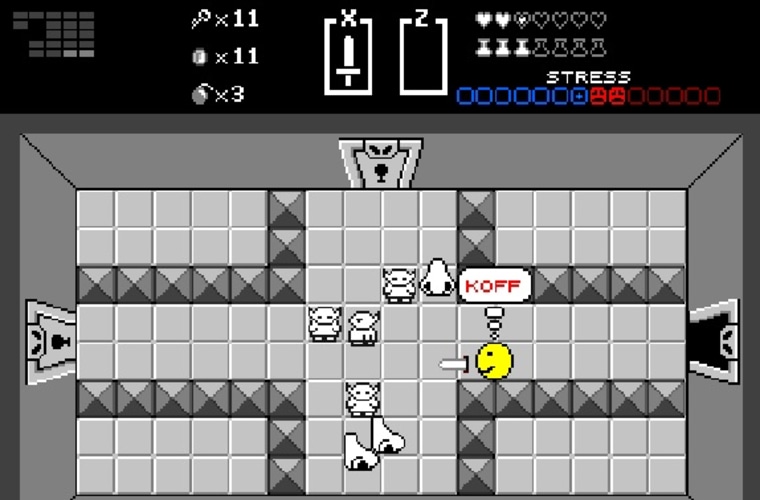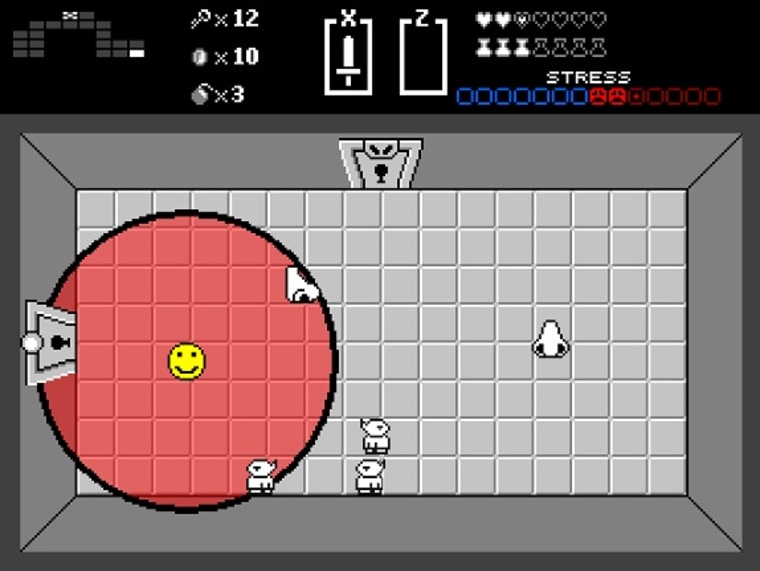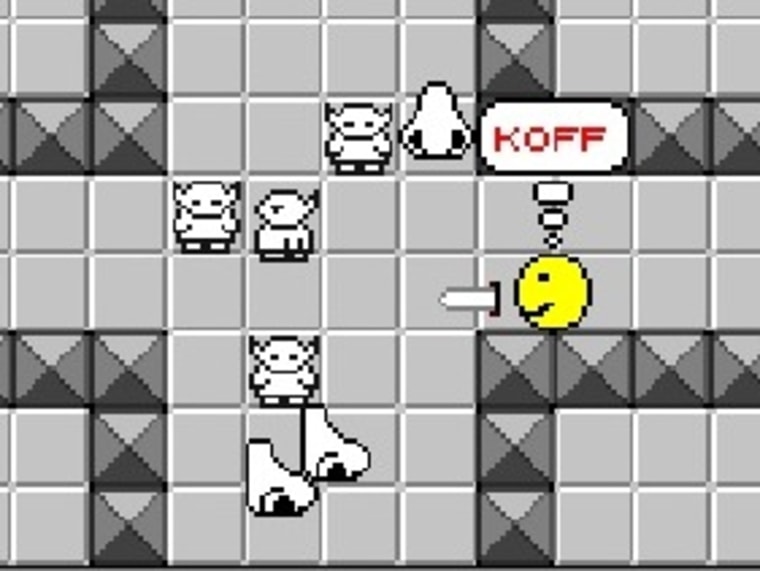
The Penny Arcade Report posted an article last September about gamers with disabilities making sure their demographic wasn’t ignored by game developers and publishers. Shortly after, we were contacted by Lars Doucet, lead developer of Defender’s Quest. Doucet has Tourette’s Syndrome, and he’s making a video game about it.
Symptoms of the syndrome
“I’ll be having symptoms as we talk,” he warned me as we booted up our mics and webcams to chat via Skype. When I asked him what kind of symptoms he might experience during our interview, he rattled them off: Throat clearing, eye twitches, sniffing, complicated hand gestures, coprolalia, corpopraxia, echolalia, and more.
“I wouldn’t want to say I have a representative case of symptoms, but I have a nice sort of smorgasbord of them,” Doucet said. “We call it Tourette’s Syndrome, but all that means is that, I think to this day, we still don’t know what causes it. A syndrome is just, you take a grab-bag of symptoms, and you draw a circle around it, and you say ‘Hey, I’ve seen some people that do this,’ and some other doctor says, ‘I saw some people do that too, let’s give it a name!’”
“So Tourette’s Syndrome, honestly speaking, could be like 13 different diseases, that just happen to present with the same pattern of symptoms, or it could be the same disease. By syndrome, we just mean it’s like a phenomenon, basically.” Doucet said he had been experiencing symptoms from a young age, sometime before sixth grade, but he wasn’t diagnosed until age 14 or 15.
Since then, he’s been shifted around from medication to medication, learned to suppress tics, and developed the social skills necessary to deal with people who don’t understand he’s not always in control. These experiences are what form the basics of game play of his project, "Tourette’s Quest."
Tourette’s is life in roguelike form
In "Tourette’s Quest," you play as a yellow smiley face as it moves from room to room in a classic Zelda-like dungeon, slaying monsters with your sword. The goal is to reach the end and climb the stairs to the next set of rooms, with escalating difficulty on each floor. You manage both positive and negative stress in the game, which will contribute to the frequency of your symptoms. The higher your stress, the more often and severe the symptoms will be.
Right now, in what Doucet is calling his prototype phase, the game only has one tic: compulsive coughing. As the character moves through rooms, it will randomly be surrounded by a red circle, accompanied by a loud buzz noise. The graphics and sound are retro in their design, and at first I wasn’t clear if the smiley face was coughing or expelling gas, but the effect is crystal clear: if the red circle touches enemies, they become agitated. Foes that were once dormant start walking about the level, making your progression more difficult.

Since negative stress is caused by taking damage or walking into a room with a large number of enemies and positive stress is caused by slaying enemies and collecting treasure, sometimes the best route is one of avoidance.
If a tic goes off while you’re trying to carefully navigate between a group of dormant goblins, there’s a moment of panic, followed by a frantic race to escape. The game becomes infinitely more interesting when you start to think of the game as a metaphor and not just a dungeon crawler. What if the goblins are just people, and you’re an intruder disrupting their lives?
“Tourette’s turns you into a very annoying human being sometimes,” Doucet told me. When you start thinking of "Tourette’s Quest" in this way, its message is amplified. You experience shame at something you can’t control or predict, and doing something we as gamers are conditioned to enjoy – hunting monsters and collecting treasure – only makes things worse.
Taking away control
In a way, "Tourette’s Quest" is the exact opposite of the measures so lauded by AbleGamers in Includification. It aims to simulate the feelings of not having control, of not being able to get by without help. “I’m breaking the cardinal rule, which is you don’t take control away from the player,” Doucet told the Penny Arcade Report.
“When you die in a Mario game, you want to feel like, ‘Those controls are tight, I made a mistake, that’s why I’m dead.’ If the controls are sloppy, then it’s like, ‘The game killed me; I have no control, I have no agency, why am I playing?’” Doucet said. “In 'Tourette’s Quest' I’m actually, intentionally designing bad controls. This means the basic controls have to be super solid, and it’s going to have to be super obvious what is happening because of your symptoms and what’s happening because of your input.”
“The winning strategy is not having perfect twitch control. The winning strategy is to manage the situations you let yourself get in. It’s kind of like playing 'Zelda II',” Doucet told the Penny Arcade Report.
“It was one of my favorite games as a kid, but I was never able to beat it. A month before I got married, I was like, ‘Okay, before I stop being a bachelor, I’m gonna go and beat 'Zelda II.' So I beat it and I found that the reason I could never beat it is that, I found that, as a kid, I would always try to just rush in and fight all the monsters and I’d always die. I learned the way to beat this game is to never take an unnecessary risk.”
“If I’m on the last floor of a dungeon and I’m down a couple hearts, it’s better to go back up and heal, then come back down rather than risk losing the life. That resonated with me, because that’s what I’m always doing with Tourette’s Syndrome. I can’t control whether I’m going to freak out at a job interview, but I can control whether I get enough sleep the night before,” he said.
“By the time you’ve fallen off the cliff, it’s too late. If you managed to rope yourself in first, you do have control of that.” Doucet made it clear that his experiences with Tourette’s are his own and he doesn’t speak for anyone else with the disease, and that his game is still a prototype. However, based on my time with the game and how it made me feel, even as a simple smiley face, he’s got a pretty strong rope.
You can download Doucet’s prototype and see for yourself.
To read more for more from our friends at the Penny Arcade Report check out these stories:
